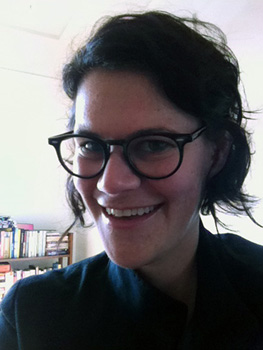
Rachel Deblinger
Holocaust survivor testimony is what sparked Rachel Deblinger’s interest in studying American postwar Holocaust memory. For her dissertation, she researched other groups for whom testimony was equally eye-opening: American Jews and Jewish communal organizations in the aftermath of World War II.
Deblinger has just finished her doctoral program in the history department at UCLA and will be starting a postdoctoral fellowship at UC Santa Cruz in September. Her research focuses on the construction of Holocaust memory in the immediate aftermath of the war across the boundaries of the postwar Jewish world. Her dissertation is “‘In a world still trembling’: American Jewish philanthropy and the shaping of Holocaust survivor narratives in postwar America (1945-1953).”
To further her research, Deblinger spent a week at the USC Shoah Foundation in April at the Researching the Holocaust workshop. Researching the Holocaust brought together graduate students from the United States, Canada, and Israel to exchange ideas, conduct on-site research, and share their results on the Holocaust, including its antecedents and aftermath. It is the second installment of a workshop series, now co-organized by the USC Shoah Foundation Center for Advanced Genocide Research and Yad Vashem in Israel.
The participants received introductions to USC’s archives and library collections, including the Lion Feuchtwanger Archive, USC Shoah Foundation’s Visual History Archive and the USC Holocaust and Genocide Studies Collection, gave presentations on their research and engaged in dialogue with each other at five different sessions.
Though she started graduate school studying Czech Jewish history and Holocaust memory, it wasn’t until Deblinger discovered David Boder’s interviews with Holocaust survivors, recorded in 1946, that she began to research how Holocaust memory from the postwar period differs from contemporary collections like the USC Shoah Foundation’s Visual History Archive.
“As I tried to contextualize Boder's work in postwar America, I discovered a plethora of survivor narratives constructed by Jewish organizations and wanted to explore the intersection of humanitarian aid going from America to Europe and the narratives that motivated that aid that travelled from Europe to America,” Deblinger said.
The workshop at USC allowed her to meet other graduate students engaged in Holocaust research and expand her network, and she was inspired to see how the other participants, whose work covers a range of topics and fields, are using the testimonies and the Visual History Archive, she said.
“I was surprised by the threads between my work and other projects and look forward to exploring those overlaps. The introduction to the USC Shoah Foundation testimony collection was also particularly interesting, as my work is centrally concerned with the collection and dissemination of survivor narratives,” Deblinger said. “I found exciting and important testimonies to support my work, but the presentation and approach described by people throughout the week was particularly valuable.”
Now that her dissertation is finished, Deblinger said the workshop gave her time to reflect and start thinking about the next steps for her research, such as writing articles or possibly a book manuscript. She will also continue to build out her online exhibit of early survivor narratives, Memories/Motifs.